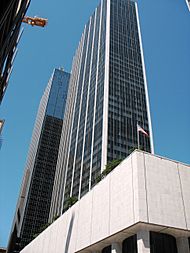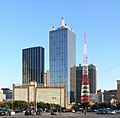First National Bank Tower (Dallas) facts for kids
Quick facts for kids The National |
|
|---|---|
 |
|
| Former names | First National Bank Tower |
| General information | |
| Status | Reconstruction |
| Type | Built as commercial offices; conversion to hotel and residential due for completion in 2020 |
| Architectural style | International style |
| Address | 1401 Elm St. |
| Town or city | Dallas, Texas |
| Country | United States |
| Coordinates | 32°46′53″N 96°48′03″W / 32.7815°N 96.8008°W |
| Completed | 1965 |
| Cost | US$35 million |
| Owner | Todd Interests |
| Height | |
| Roof | 191 m (627 ft) |
| Technical details | |
| Floor count | 52 |
| Floor area | 1,399,986 sq ft (130,063.0 m2) |
| Lifts/elevators | 27 |
| Design and construction | |
| Architect | George Dahl Thomas E. Stanley |
| Developer | First National Bank of Dallas |
|
The National
|
|
| NRHP reference No. | 100001764 |
| Added to NRHP | October 27, 2017 |
The National is a very tall building, called a skyscraper, in downtown Dallas, Texas. It has 52 floors and is about 191 meters (627 feet) high. It's one of the ten tallest buildings in Dallas.
For a while, the building was closed because not many people were using it. But it's so important that it was added to the National Register of Historic Places in 2017. In 2020, it reopened after a huge makeover that cost $460 million! Now, it's home to a fancy hotel, hundreds of apartments, and lots of space for offices and shops.
Contents
Building History
This amazing skyscraper, which cost $35 million to build, was designed for the First National Bank in Dallas. Architects George Dahl and Thomas E. Stanley created the plans. It was built to replace the bank's old home on Main Street.
The original plan was for the building to be even taller. But the height was changed because it would have been a problem for planes flying out of Dallas Love Field airport. Even with the change, the tower was still taller than a rival bank's building, the Republic Center.
Construction and Design
The building's construction started in 1961. Workers used over 25,000 tons of steel to build it. The outside of the building has a cool look with dark gray glass and white marble from Greece. The marble covers more than 8 acres!
When it opened in 1965, The National was the tallest building west of the Mississippi River. It held this record until 1969. It was also the tallest building in Texas until 1971. Later, in 1974, the Renaissance Tower became the tallest building in Dallas.
The main tower part of the building is shaped like a hexagon. It rises out of an eight-story base. The white columns on the tower used to light up every night with fluorescent lights. On the 50th floor, there was an Observation Terrace with the world's highest escalator!
Ground Level Features
At the ground level, the building has a long walkway with shops. This walkway connects Elm Street and Pacific Street. Later, it was connected to the Dallas Pedestrian Network, which is a system of walkways in the city.
The building also had a huge parking garage with 800 spaces on its lower two levels. At the time, it was the biggest parking facility in Dallas.
Changes Over Time
Over the years, the bank grew and changed names. Eventually, most of the banking operations moved out of the building. Its name was then changed to Elm Place.
For a while, the bank owned the bottom 10 floors, and a different owner had the upper 42 floors. In 2010, the upper part of the building closed because not enough people were renting space there.
Modern Transformation
In 2020, The National reopened after a massive renovation. This project was the most expensive building makeover in Dallas history, costing $460 million.
Today, the building is home to the fancy Thompson Dallas Hotel. It also has 324 apartments, 37,000 square feet of office space, and 43,000 square feet of shops.
Banking Facilities (Original Use)
The bottom eight floors of the building were originally used for the First National Bank. This part of the building covered the entire city block. It had tall, 48-foot marble arches all around the outside.
The main banking area was on the 4th floor. It was two stories high and had vaults and 50 teller stations for customers. There were also special banks for customers: a "walk-up" bank on Elm Street and a "drive-in" bank on Pacific Street.
Special Features
On the second floor, there was a unique art piece called the "Money Tree." It was a 20-foot-wide mural made from 8,500 coins and carved wood.
The ninth floor was where the bank's top leaders worked. It also had lounge areas and a dining room for executives. This floor was surrounded by a beautiful rooftop garden with sculptures and fountains. The 8th floor had a large auditorium and a cafeteria for bank employees.
Gallery
 | George Robert Carruthers |
 | Patricia Bath |
 | Jan Ernst Matzeliger |
 | Alexander Miles |




